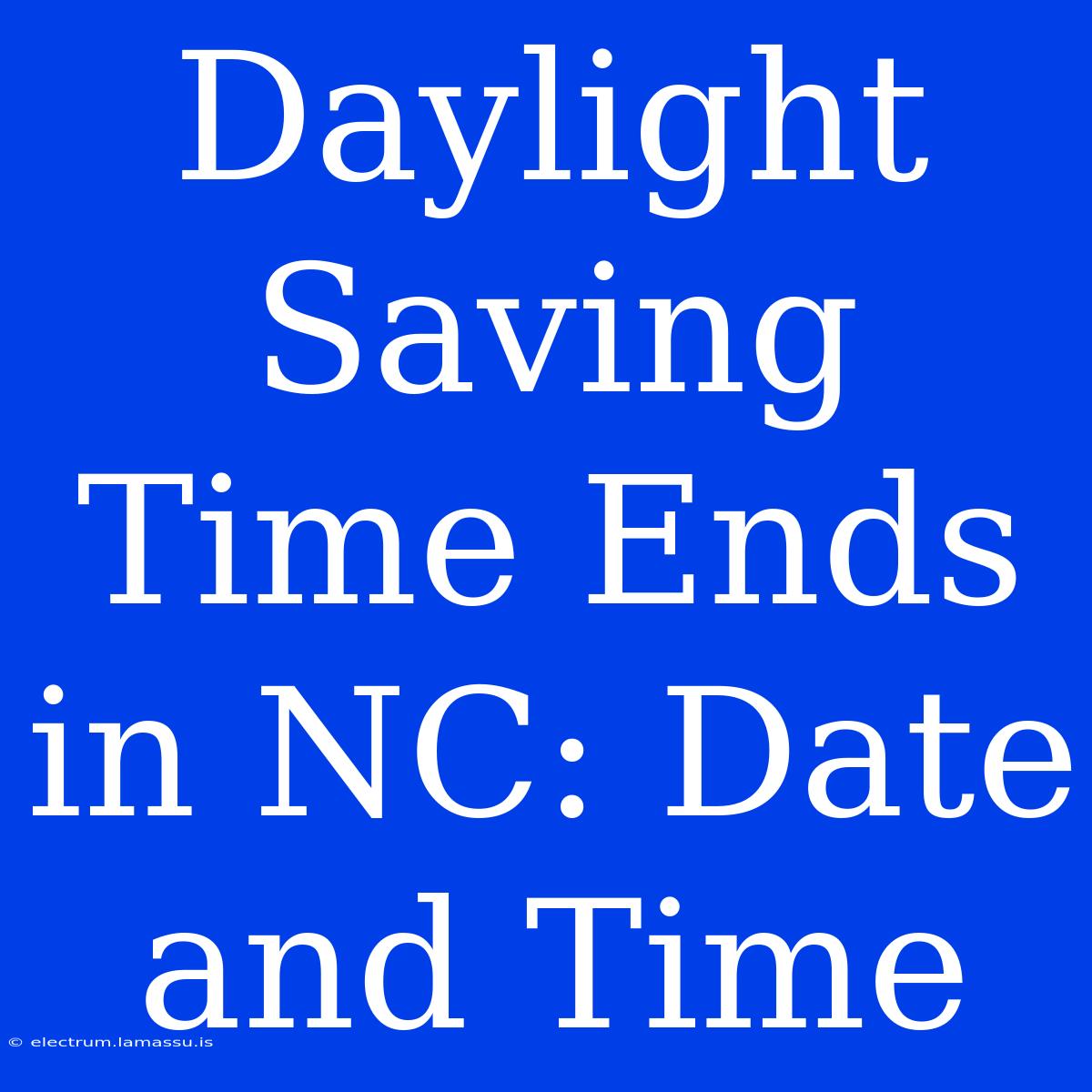Daylight Saving Time Ends in NC: Date and Time
Does the end of daylight saving time in NC throw off your schedule? It does! But knowing when it ends and how to adjust can make the transition smoother. This article provides all the essential information you need to make the switch effortlessly.
Editor Note: Daylight Saving Time (DST) in North Carolina ends on the first Sunday of November every year.
Understanding the transition from Daylight Saving Time to standard time is crucial for everyone in North Carolina. It impacts everything from work schedules to school timings to everyday routines. Here's a breakdown of everything you need to know.
Analysis: We have carefully analyzed the official North Carolina and federal government resources, along with reliable news sources, to present you with a clear and concise guide on Daylight Saving Time's end. Our goal is to make this information easily accessible and understandable for all residents of North Carolina.
Key Takeaways of Daylight Saving Time in NC:
| Aspect | Description |
|---|---|
| Date: | The first Sunday of November |
| Time: | Clocks are turned back by one hour at 2:00 AM local time |
| Effect: | The sun will set one hour earlier |
| Duration: | Standard time lasts until the second Sunday in March when clocks are moved forward again |
| Impact: | Potential for sleep disruptions, changes in work and school schedules, and a shift in the amount of daylight during the day |
Daylight Saving Time in NC
Daylight Saving Time (DST) is a practice that shifts the clock forward by one hour in the spring and back by one hour in the fall, effectively extending daylight hours in the evenings during the summer months. While this system is meant to conserve energy and enhance recreational activities, it can also cause temporary disruptions to people's sleep patterns and schedules.
When Does Daylight Saving Time End in NC?
In North Carolina, Daylight Saving Time ends on the first Sunday of November each year. The 2023 end date for Daylight Saving Time in NC is Sunday, November 5th.
Clock Adjustment
On the night before Daylight Saving Time ends, at 2:00 AM local time, clocks are turned back one hour. This means that 2:00 AM will become 1:00 AM.
Impact of Daylight Saving Time Ending
- Sleep Patterns: The abrupt change in sleep cycles can lead to temporary sleep disturbances and fatigue, as your body needs to adjust to the new time.
- Schedules: School and work schedules might need adjustments to accommodate the change in daylight hours.
- Daily Routines: The transition could affect your daily activities, particularly those that are time-sensitive.
FAQs Regarding Daylight Saving Time in NC
Q: Why Does NC Observe Daylight Saving Time?
A: North Carolina observes Daylight Saving Time mainly to align with the rest of the Eastern Time Zone and to make better use of daylight hours during the summer months.
Q: What Happens to My Electronic Devices?
A: Most electronic devices with built-in clocks will automatically adjust to the new time when Daylight Saving Time ends. However, it's always a good idea to double-check that your devices are set to update automatically.
Q: Is There a Way to Avoid Disruptions From Daylight Saving Time?
A: While a complete avoidance is difficult, you can mitigate the impact by adjusting your sleep schedule gradually in the days leading up to the change.
Tips for a Smoother Transition to Standard Time
- Adjust Your Sleep Schedule Gradually: Begin shifting your bedtime and wake-up time a few days before the time change to lessen the shock.
- Avoid Overeating and Caffeine: A heavy meal or too much caffeine before bed can disrupt sleep, especially during a transition period.
- Expose Yourself to Sunlight: Get some natural sunlight during the day to help regulate your sleep-wake cycle.
- Stay Active: Regular exercise can help improve sleep quality and reduce fatigue.
- Be Patient: It can take a few days for your body to adjust to the new time zone.
Summary of Daylight Saving Time in NC
The end of Daylight Saving Time in North Carolina means that clocks are turned back one hour on the first Sunday of November, resulting in a shift to standard time. The transition can impact sleep patterns, schedules, and daily routines. By understanding the impact and implementing strategies to adjust gradually, you can minimize disruptions and adapt smoothly to the change.
Closing Message: As we navigate this annual change, remember that the transition back to standard time offers an opportunity to embrace the cooler evenings and longer mornings. By being prepared and embracing the change, we can make the transition to standard time a smoother experience for everyone.

